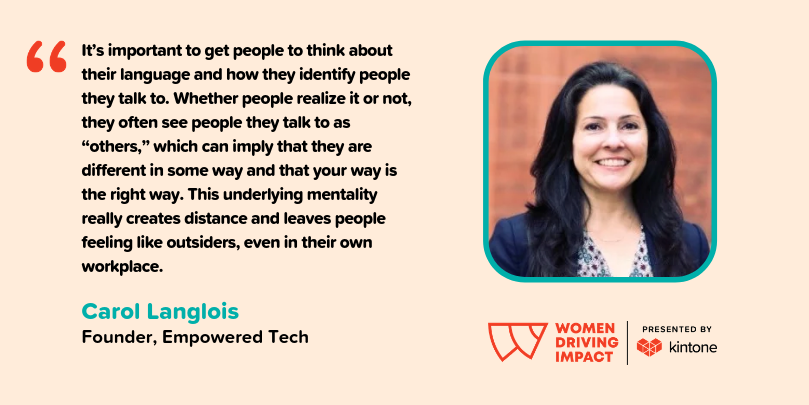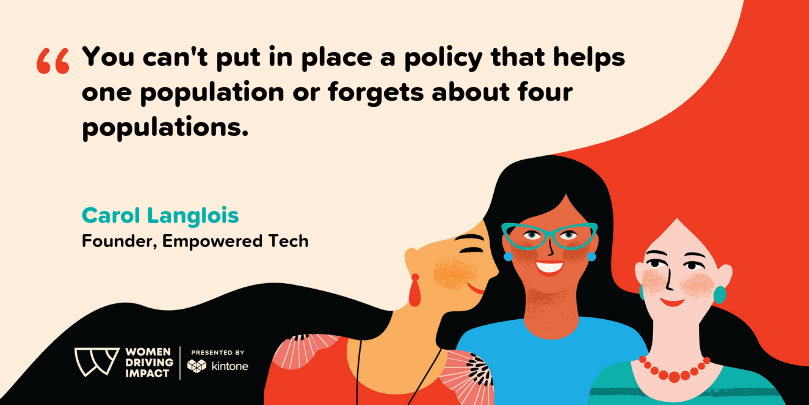Creating an inclusive workplace based on respect, belonging and empowerment may not be top of mind for many organizations, but the research and business benefits present compelling reasons for making it a priority.
Listen to this podcast episode here:
Organizations with inclusive cultures are two times as likely to meet or exceed financial goals, three times as likely to be high-performing, six times as likely to more innovative and agile, and eight times more likely to achieve business outcomes. A recent survey found 83% of millennials say they are more engaged at work when they believe their company fosters an inclusive culture.
Diversity has been linked to more creativity and innovation in the workplace, and it’s no surprise why. When people with different skill sets, backgrounds, and experiences are brought together in one workspace, it leads to more effective problem-solving.
Dr. Carol Langlois, a lifelong educator who ran the MBA programs at University of San Francisco, spoke to Kintone’s Marketing Director Nicole Jones about women’s leadership and how to create inclusive organizations that value diverse backgrounds, cultures and work styles.
Dr. Carol’s educational resume is a bright one. In addition to her work at University of San Francisco, she served as the Dean and Associate Provost at Mills College as well as Vice President of Hackbright Academy, the first all-female coding school in San Francisco that welcomes and trains women for the software engineering fields. She's also the author of the book, "Girl Talk: Boy, Bullies and Body Image,” a compilation of interviews with teen girls on the topic of self-esteem, and is the founder of Empowered Tech, a community space for women in tech to come together to share tips, tools and resources with one another.
Nicole Jones: How did your background in academia and female empowerment help redefine Hackbright’s admissions process?
Dr. Carol Langlois: Previously, I ran MBA full-time, part time, and exec programs, so I've read thousands upon thousands of MBA applications, as you can imagine. You can tell pretty quickly who's going to be a good fit for a program, both academically but also as a culture fit.
When I went to Hackbright, I wanted to learn how I could encourage more women to be a part of the program. I started by looking at some of the really successful women who graduated from the program. I wanted to know everything that I could get my hands on about them. I then used patterns from their data to identify specific skill sets, and so on.
As a base, if someone had a background in STEM, yes, they probably have a higher propensity towards coding programs. But then we identified other things that were just as important. It came down to the non-tangibles such as emotional intelligence, resiliency, and flexibility.
As a result of this, we started tweaking interview questions to focus more on non-technical skills. How an applicant handles challenges is more telling for us for whether you’re going to be successful in the program and then will you be placed at a company afterwards.

Nicole: How did this lead to the created of Empowered Tech?
Dr. Carol: When I left Hackbright I decided to build Empowered Tech. I wanted it to be a community space where women could come in and get feedback and support for their questions. Questions such as "Has anyone else experienced this at work?" or "Hey, this is going on with my manager. Have any of you had this experience?" or "I'm on an all male team,” which comes up a lot. Do you know how wonderful it is for a female software engineer to walk into a room and find seven other women and they all say, "I'm the only woman on my team?" They're instant family. It really helps give these women a sense of community away from work.
I started Empowered Tech when I left Hackbright last September. And we started with 12 women and now we're at almost 780 women. It’s been so exciting to grow.
Nicole: And I know you bring in some really great speakers across different companies and different fields on a variety of topics. Does imposter syndrome come up for women working in tech and the digital organizations? If so, how do you recommend we tackle imposter syndrome and support women’s leadership?
Dr. Carol: It's a very important topic and it's one that I've actually studied and written for. I've done therapy with women who have had issues with imposter syndrome, which is this belief that everyone else in the room knows so much more than you and you really don't know why you're there or how you got there.
Imposter syndrome happens a lot to women who find themselves in environments that have traditionally male-dominated. So think back to the 1940s, 50s, maybe even 60s where women were not necessarily welcome in graduate programs.
Today, I hear women at Empowered Tech say they go to these interviews or they go to these events and they just don't feel like they're welcome in the room. Well, that's not just coming out of nowhere. But let’s add a second layer to it. Let’s add in race and let's think about that: women of color trying to enter, or entering areas that have not been welcoming to them as both women and minorities. Their feelings of imposter syndrome are magnified.
A lot of this feeling is driven by companies. If companies produced cultures that felt more welcoming, less threatening, less bro-culture, then these women would come in with less of these feelings.
Nicole: So what can companies do to create environments that are more welcome to a diverse group of employees, particularly women reaching for leadership roles?
Dr. Carol: I just went to the Tech Inclusion Conference, and there were so many great speakers from a variety of backgrounds: a mom reentering the workplace, a male with a physical handicap, someone who identifies not as male or female.
One of the things that they all brought up was this fact that the culture they face has the right to ask them questions around like, "Oh, what happened to you?" Or, "Oh, why do you feel that way?" as if because they don't feel that way, why does someone else?
It’s important to get people to think about their language and how they identify people they talk to. Whether people realize it or not, they often see people they talk to as “others,” which can imply that they are different in some way and that your way is the right way. This underlying mentality really creates distance and leaves people feeling like outsiders, even in their own workplace.

There’s so much more training companies can do with regards to cultural sensitivity.
One of the things I thought looked really promising is that we have so many more women in executive leadership roles that can think about what other women need or want in a work culture, whether it's needing to work from home to care for your kids or look after an elderly parent, because we all know that a lot of that primary caretaking does fall on the responsibility of the women. So how can companies adjust to work with that?
Now let's get more women and women of color and people of color and people with disabilities in those roles so they can start looking at the entire company and what the whole company is going to benefit from. You can't put in place a policy that helps one population or forgets about four populations.
Nicole: Thanks for sharing your time with us and the Kintone community!
Learn more about Dr. Carol Langlois and Empowered Tech, a free community space for women, with monthly workshops and panel events. Dr. Carol recently started Career Club, a six week workshop one day a week, just for a few hours a day where it's basically be figuring out what your next step is in your career, trying to break into tech and or trying to move into your next job into tech. It’s goal is to be a one stop shop for all your career needs from resume to your three minute elevator pitch to your negotiating to how to build out your networks to how to understand a tech company.
About the Author
Nicole is Director of Marketing at Kintone, with 10+ years experience in content strategy, campaign management, lead acquisition and building positive work cultures of empowered, purpose-driven team members. She spent seven years as a journalist, previously serving as a CBS San Francisco digital producer, NPR contributor, Patagon Journal deputy editor and reporter for several publications, including the Chicago Tribune. She's passionate about the tech for good space, social entrepreneurship and women leadership. On the weekends, you’ll likely find her putting her Master Gardener skills to use in at community gardens in Oakland.











